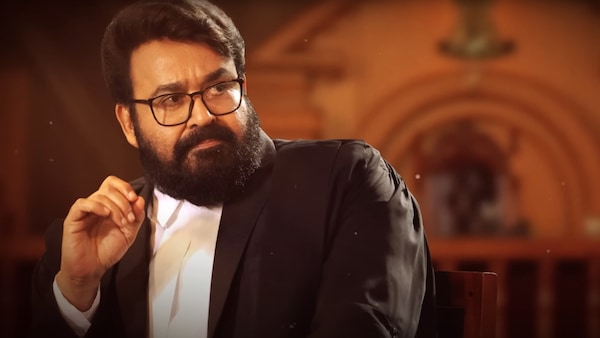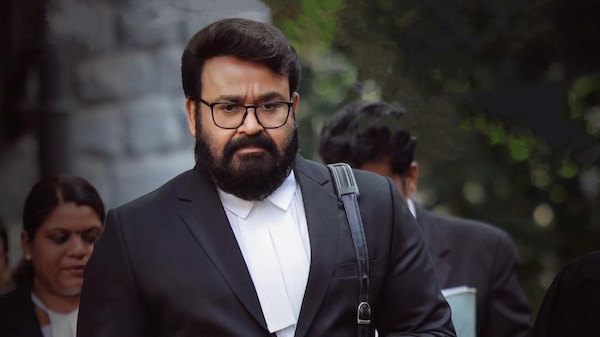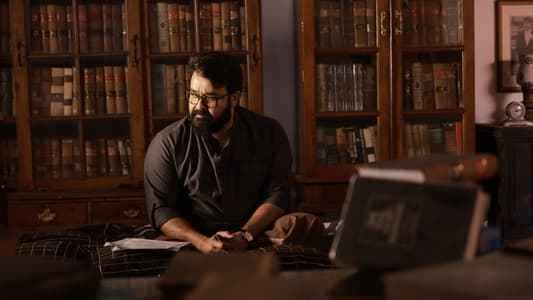Neru movie review: A stirring final act redeems this procedure-heavy courtroom drama led by Mohanlal and Anaswara Rajan
Drishyam filmmaker Jeethu Joseph proves once again why he's a master of the third act with Neru, an emotional courtroom drama anchored by Mohanlal and Anaswara Rajan

Last Updated: 10.46 AM, Dec 22, 2023
Neru story: Sara, a visually-impaired sculptor, is raped and the culprit, son of a wealthy entrepreneur, is apprehended by the cops. Appearing for the accused is a senior Supreme Court lawyer, while the victim’s family struggles to find a prosecutor – till Vijayamohan, who has not been practising since being suspended by the Bar Council, steps in. The special nature of the case – given that there’s no eyewitness – makes it even more challenging for the rusty lawyer to prove the truth in court. Will Vijayamohan be able to deliver justice for Sara?
Neru review: Director Jeethu Joseph said that he had nursed the core idea of Neru, for 10 years. The reason being that the filmmaker wasn’t confident he could pull off the courtroom drama, without the help of lawyers and their experience. When one watches Neru, it becomes obvious why the director took so long to get the movie off the ground. It’s heavy on courtroom procedures and law, and it’s not until Jeethu reaches the third act of the movie, he unleashes the cinematic elements in all its force.
The makers weren’t trying to control expectations when they pitched the film as an emotional courtroom drama – because that’s what it is, through and through; only that its ‘emotional’ quotient is most dominant in the stirring second half that is very much Jeethu’s territory, as proven in movies like Drishyam. The director sure knows how to end a film and while this was missed in his previous movies 12th Man and Kooman, he is on point in Neru.
The movie revolves around a sexual assault trial and it’s the battle between the defense and prosecution that takes the plot forward. The lawyers representing the two parties share history, but this is only a small element that Jeethu and his co-scriptwriter Santhi Mayadevi add to spice up the legal battle. The case is complicated as there’s no witness and the victim is visually-impaired. Add to this, the criminal justice system’s aspect that the onus is always on the prosecution to prove that the accused is guilty.
Neru has these interesting elements to play with; however, unlike the usual legal dramas, the team decides to stick to the courtroom for as much as possible. Not only in terms of time and space, but also to ensure that the courtroom procedures are as realistic as they come. This does make some of the sequences redundant and the accused’s tactics somewhat predictable. Also, one cannot help but feel that the procedures were given too much importance and this does sacrifice the cinematic elements of the film. You could argue that was done with the intent of showing how difficult it can be to prove that an accused is guilty in our legal system, but the impact gets lost when it’s too packed with legal terms and IPC sections.

However, as soon as the film reaches its final leg, Jeethu speeds things up, by adding an emotional layer to the proceedings and this is what works the most in Neru. While every now and then, you do get to see Sara’s perspective, it’s in the final act that her character and resilience gets their due. In fact, that’s the best trick that Jeethu pulls off – misleading the audience to think that the heroic act comes from Vijayamohan and instead, gives it to Sara.
The rousing final 30 minutes isn’t just limited to its main characters finding redemption, but the writers also cleverly insert how survivors of sexual assault are victim shamed – at court as well as in society. A dialogue of Vijayamohan about such survivors also promises to elicit applause from the crowd – and this time, unlike his movies like Aaraattu, Alone and Monster, it feels real and not something written purposely with the attempt to show the audience that his characters are ‘progressive’. That said there are few shots in the film – when the lawyers recount the shocking incident – that Jeethu could have edited out.

Mohanlal pulls off Vijayamohan with ease, but there’s a certain restraint to the character that also lends an element of freshness from his roles in the past three years. That he can up the game in a matter of a shot is no surprise, but Jeethu does it effectively and without the intention of playing to the gallery, makes this character laudable. Anaswara Rajan as Sara is brilliant in the movie, emoting precisely the shock, the fear, the anger, the frustration and most importantly, the strength.

Siddique, who plays the defense lawyer Rajasekharan, is great in his role and comes off as a worthy adversary. Santhi Mayadevi, Jagadish, Priyamani, Sreedhanya and Ganesh Kumar play their parts well. A huge aspect that makes Neru work is its music by Vishnu Shyam, which peaks at the end – marking a triumph for justice.
Neru verdict: Even though the courtroom procedures take precedence in Neru for a large part of the film, the stirring final act of the Mohanlal-starrer more than makes up for it.
Subscribe to our newsletter for top content, delivered fast.

